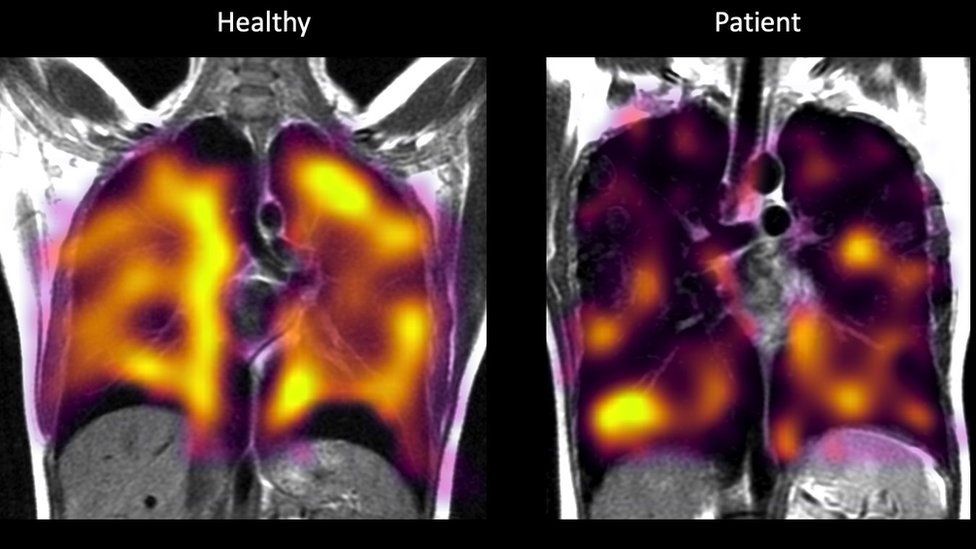The findings raise the potential that Covid may induce microscopic damage that is undetectable by standard testing.
Abnormalities in the lungs of long-term Covid sufferers have been discovered recently, which might explain why some individuals feel dyspnea long after their first infection.
The results of a 36-patient pilot trial raise the potential that Covid may induce slight lung damage that is undetectable by conventional diagnostics.
Breathlessness is a symptom in most long-term Covid users, but it’s unclear if this is due to other variables like changes in breathing patterns, weariness, or something more fundamental.
According to Dr. Emily Fraser, a doctor at Oxford University Hospitals and a co-author of the paper, the current results are the first indication that underlying lung health may be compromised.
New Path For Oxygen
Fraser added that it is the first research to show lung problems in those with long Covid who are breathless and when previous examinations have been inconclusive.
It does imply that the virus is producing some permanent anomaly inside the microstructure of the lungs or in the pulmonary vasculature.
She said that further investigation would be needed to determine the clinical importance of the results, especially how the apparent alterations connect to shortness of breath.
Claire Steves, a senior clinical lecturer at King’s College London who was not involved in the study, said the results would be of great interest to anybody suffering from long-term dyspnea after Covid.
Claire added they imply that the lung’s effectiveness in performing what it is supposed to do – exchange carbon dioxide and oxygen – may be hampered, even if the lung’s structure seems normal.
However, scientists really need to wait till the research is finished to determine whether these early results are robust, and if so, how much they explain, and what the implications are in terms of prospective therapies.
Fraser and colleagues are the most recent to hint to physiological abnormalities found in those with chronic Covid, with research released this week indicating an antibody signature that might assist in identifying those most at risk.
The most recent trial, which aims to enroll 400 people, employs a specialized MRI imaging technology in which patients breathe in xenon gas while reclining in a scanner.
The gas can be tracked as it passes from the lungs into the circulation, indicating how well the lungs are working.
In contrast, CT scans only reveal the anatomy of the lungs.
Pioneering Trials
The pilot contrasted three groups: patients with long Covid who have regular CT scans, persons who have been hospitalized with Covid for more than three months but are not experiencing long Covid, and a healthy control group.
The preliminary findings, published on the bioRxiv pre-print platform, demonstrate substantially reduced gas transport from the lungs to the circulation in these chronic Covid users, even when other tests are standard.
Similar irregularities have been discovered in Covid patients admitted to the hospital with more severe illnesses.
These individuals had never been in hospital and were not suffering from a severe acute illness when they were infected with Covid-19, as Prof Fergus Gleeson, a radiologist at Oxford University Hospitals NHS Foundation Trust and the study’s principal investigator states.
Some of them have had their symptoms for almost a year after acquiring Covid-19.”
Gleeson said that the team is now seeking to identify how many people on long Covid have abnormal scans, the importance of the anomaly and whether it improves with time.
According to Fraser, the results do not diminish the need for rehabilitation programs such as breathing retraining for persons with disturbed breathing patterns.
She said rehabilitation procedures are pretty beneficial. Doctors can make improvements and put patients on the correct route.
Dr. Louise Sigfrid, a public health expert at the University of Oxford who was not involved in the study, said the results underscored the need to provide complete diagnostic tests to patients who had persistent symptoms.
She added these preliminary results are fascinating, and they are consistent with other emerging evidence on lung perfusion deficits after Sars-CoV-2 infection found in adults and adolescents.













Leave a Reply